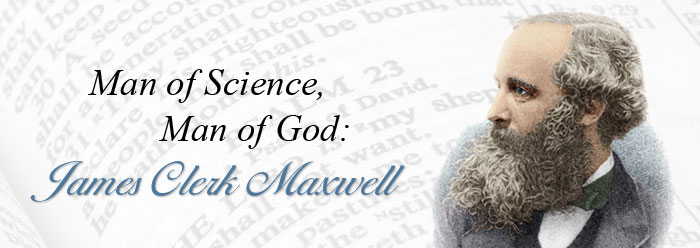Who: James Clerk Maxwell
What: Father of Electromagnetic Theory
When: June 13, 1831 - November 5, 1879
Where: Edinburgh, Scotland
From an early age, James Clerk Maxwell had an astonishing memory and an unquenchable curiosity about how things worked. His first teacher, his mother, encouraged him to "look up through Nature to Nature's God":
His knowledge of Scripture, from his earliest boyhood, was extraordinarily extensive and minute....These things were not known merely by rote. They occupied his imagination, and sank deeper than anybody knew.1
After growing up mostly on an isolated country estate, young Maxwell entered the Edinburgh Academy in 1841. The other boys made fun of his mannerisms, accent, and wardrobe, but he soon befriended Lewis Campbell (his future biographer) and Peter Guthrie Tait. Both would become notable scholars, and remained his lifelong friends. While at Edinburgh, Maxwell won medals for mathematics and Scripture biography.
At age 14, he wrote Oval Curves, a paper on the properties of ellipses and curves. It was presented to the Royal Society of Edinburgh by James Forbes, a University of Edinburgh professor of natural philosophy, since Maxwell was "too young" to present it himself. Maxwell entered the university at age 16 and produced Rolling Curves. Once again he was considered too young to present it to the Society, so the paper was read by his mathematics professor, Philip Kelland.
In October 1850, Maxwell left Scotland for Cambridge University, where he accomplished a significant portion of his translation of electromagnetism equations, the work for which he is best known. He also laid out the principles of color combination in Experiments on Colour--on which occasion he was finally allowed, in March 1855, to present his own paper to the Royal Society of Edinburgh. He became a fellow of Trinity College that October, and the following year applied for and eventually accepted the Chair of Natural Philosophy at Marischal College in Aberdeen.
When the college merged with the University of Aberdeen's King's College in 1860, there was no need for two chairs of natural philosophy, so Maxwell was laid off. He lost an Edinburgh professorship to his childhood friend Tait, but was granted the Chair of Natural Philosophy at King's College in London.
His color research garnered Maxwell election into the Royal Society of London in 1861. He often lectured at the Royal Institution, where he regularly conversed with Michael Faraday. At King's College, he produced his most significant work in electromagnetism, a multi-part paper called On Physical Lines of Force. He also published papers on electrostatics and displacement current, the latter focusing on the phenomenon known as the Faraday effect.
He resigned from King's College in 1865 and returned to his childhood home at Glenlair, where he wrote the textbook Theory of Heat and an elementary treatise called Matter and Motion. In 1871, he became the first Cavendish Professor of Physics at Cambridge. He died at 48 in Cambridge of abdominal cancer on November 5, 1879.
Darwin's Origin of Species was published during Maxwell's lifetime. Maxwell was not convinced evolution was a viable theory of origins, nor was he afraid to speak on the matter:
No theory of evolution can be formed to account for the similarity of molecules, for evolution necessarily implies continuous change, and the molecule is incapable of growth or decay, or generation or destruction.…Science is incompetent to reason upon the creation of matter itself out of nothing.2
Maxwell is to this day held in high regard in the scientific community, but few know or acknowledge his strong Christian roots or his faith in the authority of God's Word. Virtually every part of his brief, but remarkable, life was spent exploring the wonder of God's creation.
References
- Campbell, L. and W. Garnett. 1882. The Life of James Clerk Maxwell: With Selections from His Correspondence and Occasional Writings. London: Macmillan and Co., 32.
- Ibid, 359.
Cite this article: Dao, C. 2008. Man of Science, Man of God: James Clerk Maxwell. Acts & Facts. 37 (9): 8.










